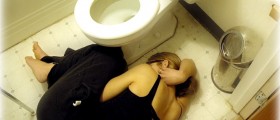
Causes of diarrhea
Diarrhea occurs when the small intestine and stomach produce much water, or when the small intestine and colon do not soak up enough water, and both of these two conditions occur due to various reasons, such as, for example, the presence of bacterial, viral or parasitic infection. Furthermore, certain types of medicines may cause malfunctioning of the digestive system, such as antibiotics, hypertension medicines and medications used in chemotherapy. Laxative abuse, toxins and food poisoning, as well as collagenous colitis, cancers and liver diseases, are also some of the potential causes for the occurrence of diarrhea.
Side effects of diarrhea
The main adverse effect of this condition is dehydration because the body loses much of fluids and minerals. Therefore, while experiencing diarrhea it is crucial to take in plenty of liquids in order to replenish the body liquids.It is observed that when one suffers from diarrhea, his/her mouth is dry and excessive thirst appears, so only drinking a lot of water can solve this side effect. Tenderness in the abdomen, as well as the abdominal pain, are the symptoms which accompany diarrhea most of the times. Weakness, excessive fatigue and heart problems may also be some of the side effects of diarrhea and a doctor should be visited, especially if diarrhea affects the normal working of the heart.
Diarrhea may also induce nausea, vomiting and irritation of the anus. When it affects infants and if it is not treated at once, it may even cause certain complications to the brain functions. Orthostatic hypotension, kidney failure, shock, acidosis and coma may also be caused by prolonged diarrhea and these side effects of this condition are very serious.
Treatment for diarrhea
Diarrhea is cured when the cause of it is eliminated, but until it is done, it is important to drink plenty of water, or the doctors should prescribe certain medicines that bind water in the digestive tract and certain medicines that have properties to relax the muscles of the colon, as well as the muscles of the small intestine.











_f_280x120.jpg)





Your thoughts on this
Loading...